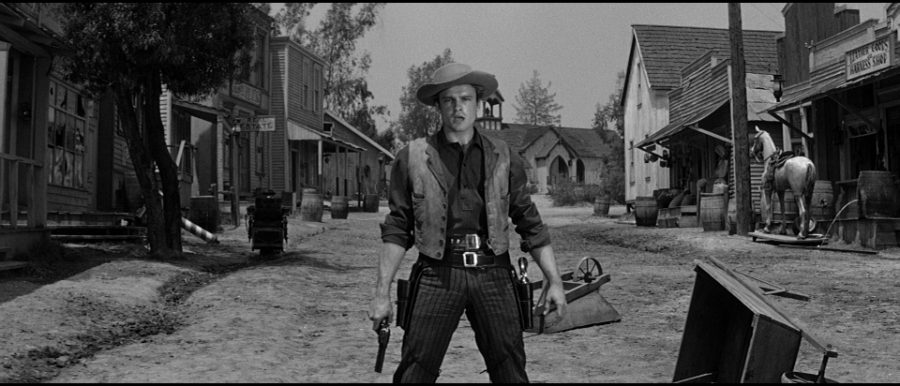When Samuel Fuller, famous for his B-movie aesthetic in works like Underworld USA (1961) and Shock Corridor (1963), turned his noirish hand to a cowboy yarn (which he wrote, directed and produced) it more than matched his ghoulish, tabloid tastes. Maybe he did it for a dare. The result is like a Western filmed by Weegee.
Barbara Stanwyck is Jessica Drummond the ‘high riding woman with a whip’, who, as the movie’s song has it, ‘commands and the men obey’. She runs her ranch with the help of 40 henchmen, either from behind her laden dinner table or riding the range with the kind of severe hauteur and fearsome cynicism we expect from Stanwyck, the ultimate femme fatale.
Scenes are full of unexpected action – from the disconcerting opening of thundering and whinnying horses, to the villains who come over like dangerous juvenile delinquents, smashing windows and shooting up the town just for the hell of it. Then there’s a thrilling sequence where the imperious Jessica and her enigmatic love interest, US marshall Bonell (the enormously charismatic Barry Sullivan), shelter from a raging tornado. Both Bonell and Jessica have troublesome brothers, which complicates matters and ends in a wedding day shooting.
Indeed, despite Bonell having killed Jessica’s no-good brother, the marshall and the cattle queen have a troubling, almost Freudian, attraction. ‘What’s the matter? You look upset,’ he says. ‘I was born upset!’, she answers.
Throughout, Fuller uses grand, sweeping crane angles and long tracking shots that give the film feverish energy (sometimes at the expense of the story, which seems to get less interesting the more it goes on), the fine cinematography by Joseph F. Biroc saving the somewhat gung-ho direction.
The winds of change are blowing through the West. New law and order, taxmen and paperwork threaten to end the frontier spirit and this adds yet another dimension to a movie that is full of ideas: a changing America, the role of women, senseless violence.
Forty Guns lacks the camp qualities of its near contemporary Johnny Guitar (1954), nor does it have the biblical grandeur of The Searchers (1956) and it will never be a classic, but its rawness was a big influence on the Spaghetti Westerns of the 1960s. It stands in the Western canon as an amazing and engaging aberration.
